Companion Planting In Your Herb Garden
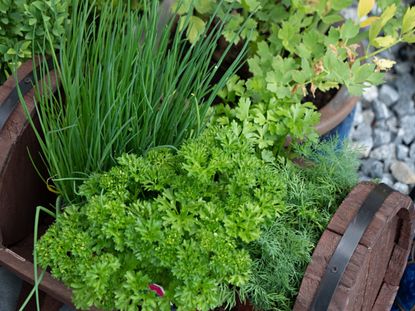

We all know the benefits of vegetable companion planting, but what about growing herbs as companion plants? Creating a companion herb garden is no different and allows you to take advantage of their beneficial relationships with other plants.
Reasons for Companion Planting an Herb Garden
Companion planting with herbs offers numerous benefits. For example, companion planting with herbs can discourage pests, which often occurs when you plant companion herbs that exude an aroma that pests find unpleasant. On the other hand, some herbs that grow well together can actually attract beneficial insects or draw unwanted pests away from more susceptible herbs.
Some herbs can even increase the essential oils in companion herbs. However, some herbs that don’t grow well together can draw nutrients and moisture from their companion plants. When choosing companion plants for your herb garden, consider these factors:
Heavy feeders planted next to each other will compete for nutrients in the soil.
Strong smelling/tasting plants planted next to one another may change the flavors and scents of other herbs or vegetables.
Interested in growing herbs as companion plants? This herb companion planting list will get you started.
Basil
Benefits - Improves the flavor of neighboring herbs. Repels flies and mosquitoes.
Gardening tips, videos, info and more delivered right to your inbox!
Sign up for the Gardening Know How newsletter today and receive a free download of our most popular eBook "How to Grow Delicious Tomatoes."
Companions - Tomatoes, peppers, asparagus, oregano (Not sage or common rue)
Chamomile
Benefits - Improves the flavor of any neighboring herb. Attracts beneficial insects and pollinators.
Companions - Cabbage, onion, cucumber
Garlic
Benefits - Repels aphids, loopers, snails, Japanese beetles.
Companions - Most plants
Mint
Benefits - Repels aphids, mosquitoes, ants, attracts bees.
Companions - Tomatoes, most plants (avoid combining mint varieties)
Chives
Benefits - Repels aphids.
Companions - Carrots, tomatoes, dill and most herbs
Tarragon
Benefits - Improves flavor of any neighbor.
Companions - Great companion to eggplant
Cilantro
Benefits - Deters spider mites, aphids.
Companions - Spinach, caraway, anise, dill
Sage
Benefits - Repels some beetles and flies.
Companions - Rosemary (not Rue)
Dill
Benefits - Discourages spider mites, aphids.
Companions - Onions, corn, lettuce, cucumbers, (not carrots, tomatoes, fennel, lavender, or caraway)
Rosemary
Benefits - Deters a variety of pests.
Companions - Beans, peppers, broccoli, cabbage, sage (Not carrots or pumpkins)
Catnip
Benefits - Repels harmful pests, attracts bees.
Companions - Pumpkins, beets, squash, hyssop
Lavender
Benefits - Repels harmful pests, attracts butterflies.
Companions - Cauliflower
Note: Keep in mind that some herbs just don’t grow well together. For example, fennel doesn’t get along with most other plants and is best planted in an area all by itself, mostly because of the strong aroma. However, from its solitary location, fennel repels fleas and aphids and attracts beneficial pollinators.

A Credentialed Garden Writer, Mary H. Dyer was with Gardening Know How in the very beginning, publishing articles as early as 2007.
- Amy DraissDigital Community Manager
-
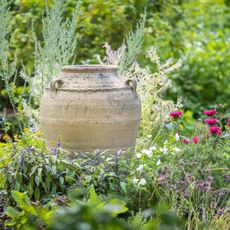 Front Yard Herb Garden Ideas To Spice Up Your Landscape
Front Yard Herb Garden Ideas To Spice Up Your LandscapeUse your imagination and plant a lovely front yard herb garden. You’ll love the convenience, the fragrance and the beauty, and pollinators will appreciate it.
By Amy Grant
-
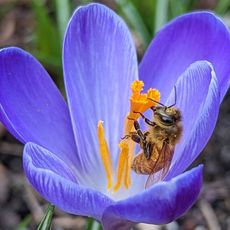 When To Clean Up Garden Beds In Spring To Protect Pollinators
When To Clean Up Garden Beds In Spring To Protect PollinatorsEvery spring, I'm reminded that many species of insects have used my garden as a winter hotel and may not be ready for a wake-up call just yet.
By Teo Spengler
-
 Grow Tasty Herbs For Roast Turkey In Your Garden
Grow Tasty Herbs For Roast Turkey In Your GardenCan you season your turkey with herbs you grow in your own garden? Yes! Click to learn more.
By Amy Grant
-
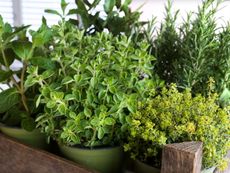 10 Easy Herbs For Beginners
10 Easy Herbs For BeginnersIf you’re new to herb growing, there are some perfect beginner herbs that are low maintenance and easy. Here are our top ten.
By Mary Ellen Ellis
-
 Growing Tomatoes In Containers For Beginners
Growing Tomatoes In Containers For BeginnersNothing says summer like homegrown tomatoes! Did you know you can grow tomatoes in pots? Click to learn how to grow tomatoes in containers.
By Laura Walters
-
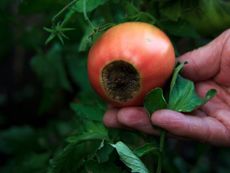 10 Common Tomato Diseases
10 Common Tomato DiseasesWhen your tomato plants stay healthy, you can harvest them all year long. Click here for the top 10 worst tomato diseases.
By Amy Draiss
-
 How To Make A Rain Gutter Herb Garden
How To Make A Rain Gutter Herb GardenOne really fun look outside the box is a hanging rain gutter herb garden. A gutter planter is a unique way to house and showcase plants.
By Bonnie L. Grant
-
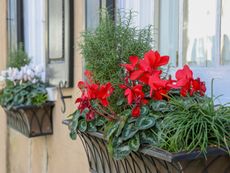 Grow A Beautiful, Edible Herb Window Box
Grow A Beautiful, Edible Herb Window BoxGrowing herbs in window boxes is a space-saving method for producing culinary ingredients for kitchen use. Click for more.
By Laura Miller
-
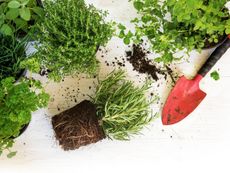 Best Herbs To Direct Sow Vs. Start Indoors
Best Herbs To Direct Sow Vs. Start IndoorsKnowing when to buy herb plants or start them from seeds or cuttings is essential to your success. Read on to learn more.
By Laura Miller
-
 Learn About The Highly Prized Silphium Herb
Learn About The Highly Prized Silphium HerbWhat if there was a perfect plant? In ancient times such a treasure existed. It was the silphium plant.
By Laura Miller